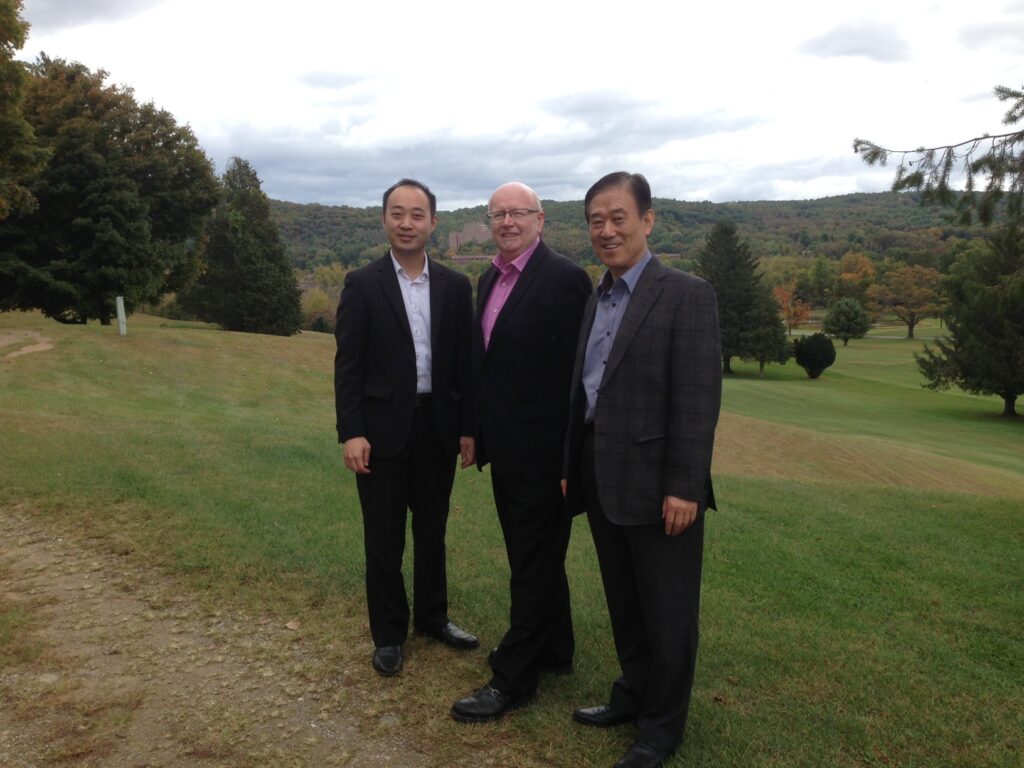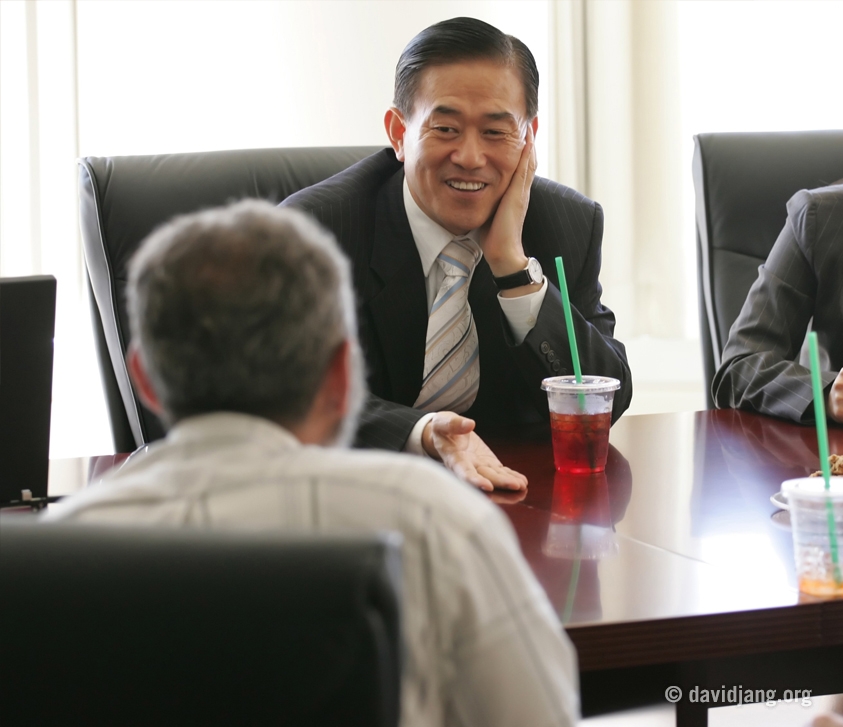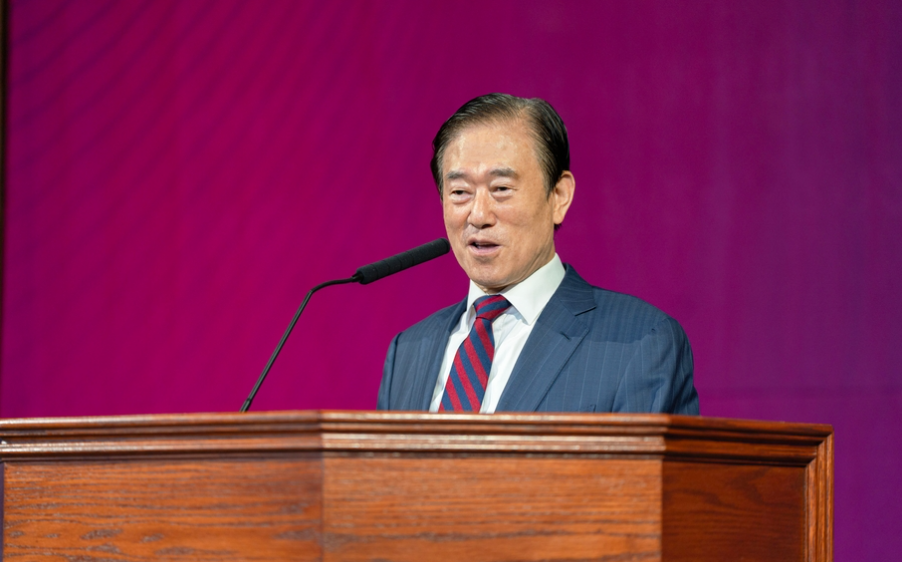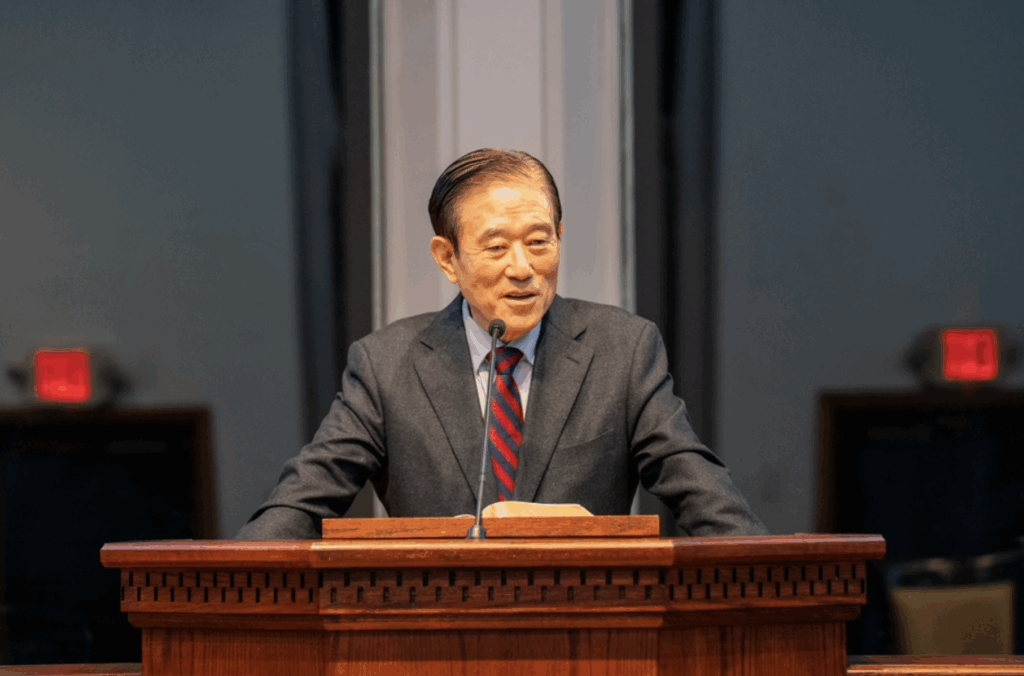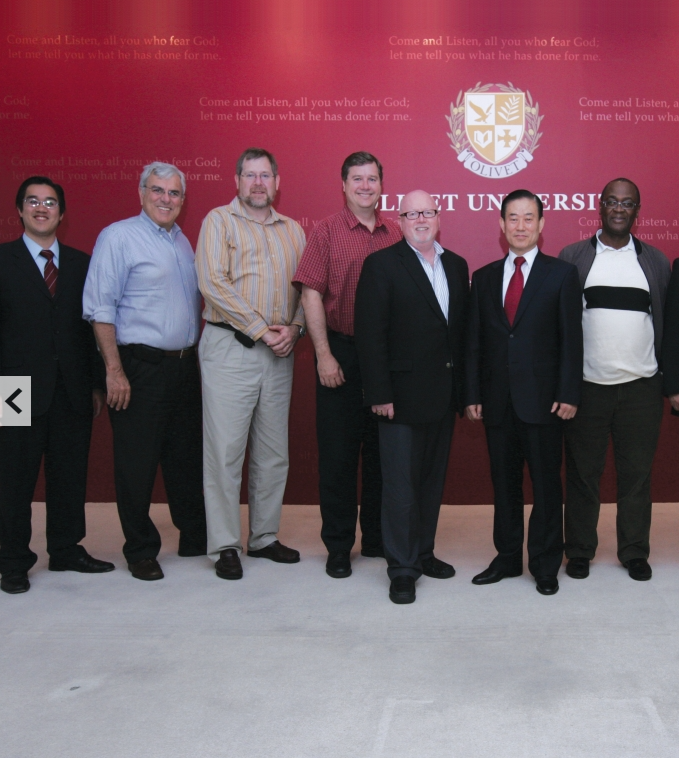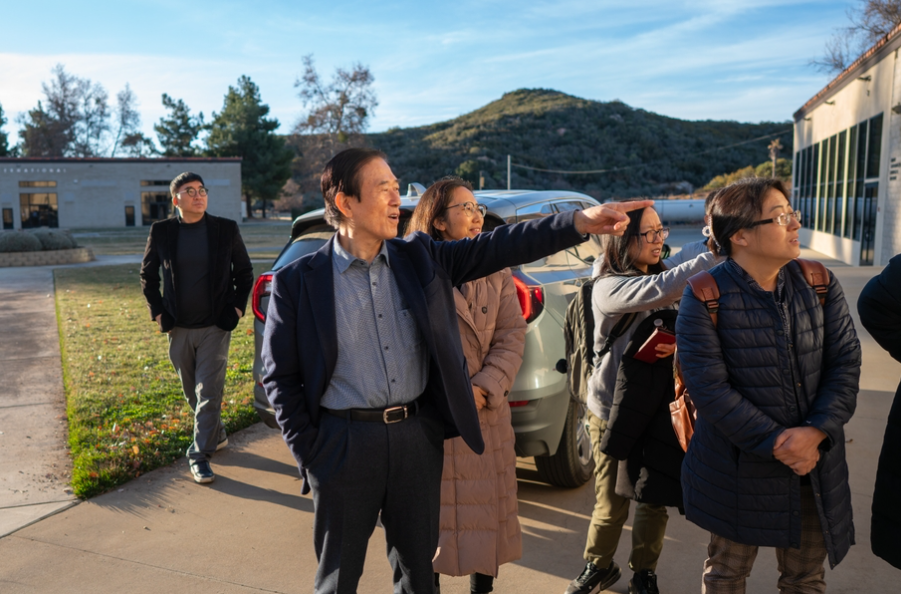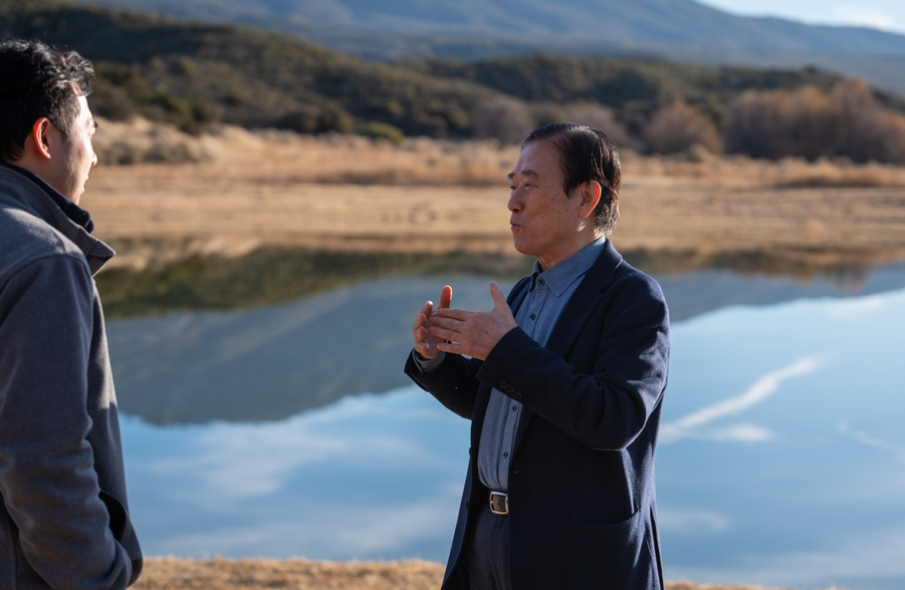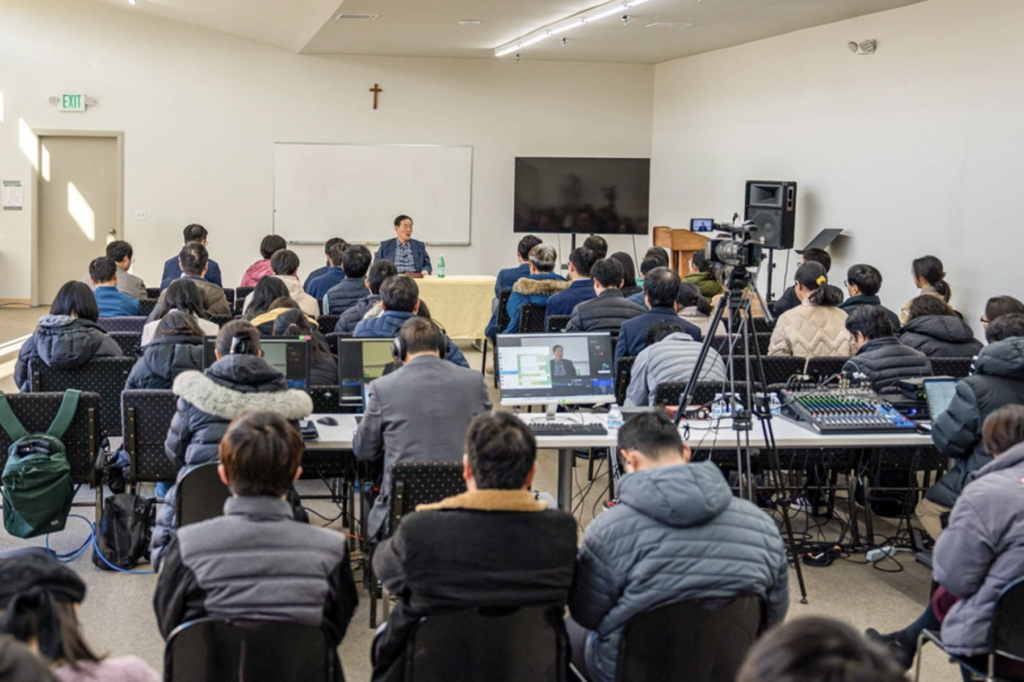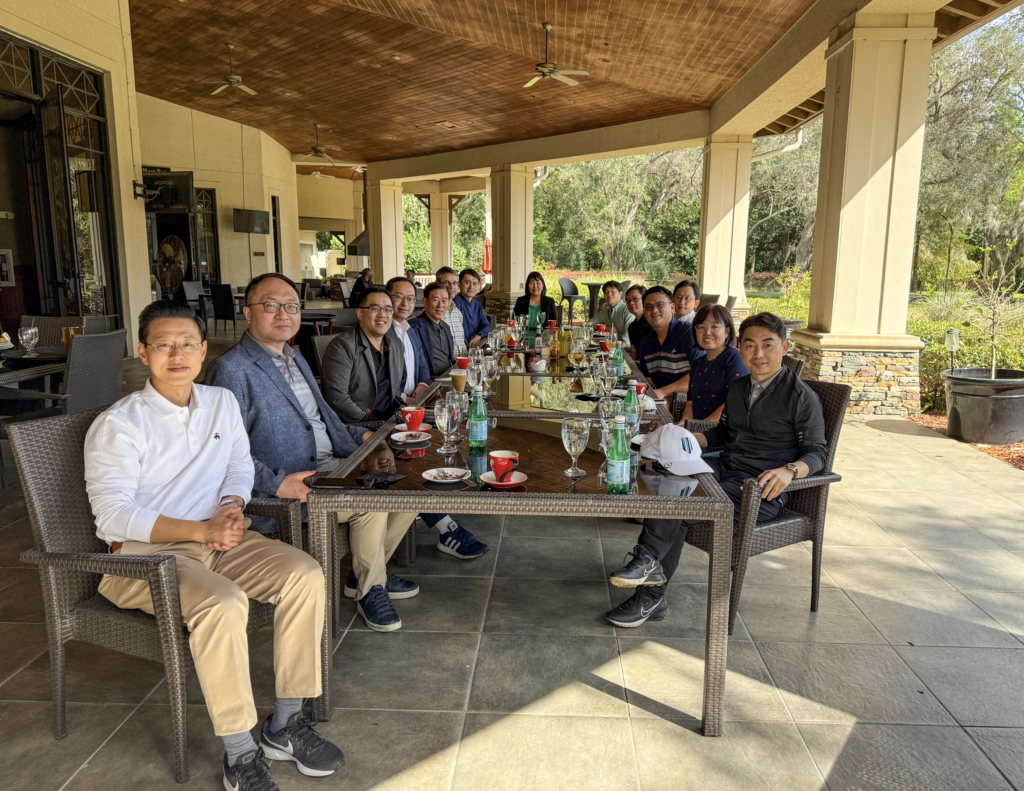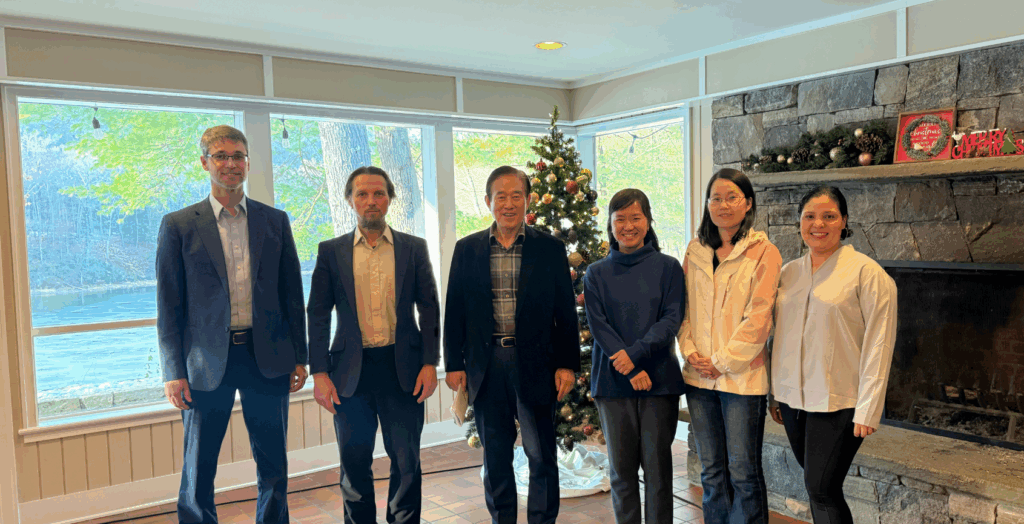
1. The Gospel and Love
The Gospel is the love story of Christ. It is the good news proclaimed by the church and the message of God’s salvation delivered to us through the life and teachings of Jesus Christ. We can confirm in various parts of the Bible why this Gospel must be inevitably connected to “love,” and why the Gospel demonstrates the pinnacle of sacrificial love. As some biblical scholars say that Luke chapter 15 is “the chapter that explains the Gospel best,” it contains the core of both salvation and love. At the same time, the essence of the Gospel is transformation of life, and that transformation is ultimately the way for humanity to become truly human—namely, restoring the “image of God” that lies within us. For this Gospel not to remain merely an emotion or a temporary excitement but to be realized as “love” in our actual lives, it must have its source in God, and its practical outworking should appear as “sacrifice.”
Many people think of the Gospel as a set of doctrines or a system of faith that the church must convey. However, the Gospel that Jesus personally demonstrated through His life is, literally, “love itself that gives everything for the sake of a single life.” A representative chapter analytically describing the essence of that love is 1 Corinthians 13. The so-called “Love Chapter,” articulated in the language of an urban society by the Apostle Paul, explains the attributes of love in a highly logical and expository manner. The statement that begins, “Love is patient, love is kind. It does not envy…” (1 Cor. 13:4ff) is a universal language easily understood no matter where or when it is heard in the world. Yet it is crucial to recognize that this is not merely an ethical teaching or a set of polite manners; rather, it is the sacrificial love Christ showed on the cross.
Toward the end of 1 Corinthians 13, Paul says, “Then I shall know fully, even as I am fully known” (1 Cor. 13:12). He equates love with “knowing.” In Hebrew, the word “to know” does not simply denote the acquisition of information; it signifies personal communion and deep intimacy. Accordingly, love entails a relational aspect of deeply understanding and accepting one another. The phrase, “Then I shall know fully, even as I am fully known by the Lord,” can be interpreted as, “Just as the Lord has loved me, I too will come to know the Lord with perfect love.” Thus, the nature of love is rooted in intimate fellowship with God.
As 1 John 4:19 teaches, “We love because He first loved us,” the Gospel is the declaration that God first loved us. We can say that we “learn” love only because we have first been loved by God; and as we gradually come to realize that love, we too can be transformed into beings who love others. In this way, the Gospel thoroughly begins with God’s love and sacrifice, and its targets include everyone—even tax collectors and prostitutes. Jesus humbled Himself to the point of death, and in that humbling and sacrifice, God’s love was most clearly revealed.
Romans 10 says, “It is with your heart that you believe and are justified, and it is with your mouth that you profess your faith and are saved.” Faith means that the heart opens first, and from that heart naturally flows a confession. The circumstances that open the heart vary: sometimes intellectual enlightenment comes first and then opens the heart; sometimes the heart opens first and intellectual understanding follows. The important point is that heart and mind must move together for complete faith and the practice of love to be possible. Just as the Greeks emphasized that “human beings are rational beings,” the process of contemplating what love is, why the Lord has saved us, and why we ought to believe in Him is extremely important. Without such understanding, our faith risks degenerating into mere formalities or habitual acts.
What then, concretely, is love? From beginning to end, the Bible consistently describes love as “sacrifice.” Among many historical examples, one famous case is that when Pompeii was buried by a volcanic eruption, the remains of a mother were found holding her child in her arms. The mother’s instinctive sacrifice to protect her child with her own body at the moment of the explosion remained there, fossilized for all to see. This vividly illustrates how powerful the love to preserve life truly is. In general, life has a tendency to focus on self-preservation. When plants sprout from the ground, they engage in a survival competition to claim more sunlight and nutrients rather than yield to one another. However, contrary to this natural inclination, love makes it possible to “give way” to other lives and protect them through one’s own self-sacrifice.
We confess that the life of Jesus Christ—namely His death on the cross—is indeed the apex of “sacrificial love.” The event of Jesus on the cross was the most dramatic act of love, in which the perfectly sinless One died in the place of sinners for their salvation. As Pastor David Jang often emphasizes in his sermons and lectures, the core of the Gospel is precisely this sacrifice. The Lord’s death is not merely a religious symbol or ritual; it is an actual expression in which He personally showed all of us, “This is how I love you.” There are countless forms of love in the world, but the love that “spares nothing of oneself and gives one’s whole being” is the most ultimate form; and that is the essence of the message that the Christian Gospel proclaims.
Moreover, once we realize the value of this love, we come to see that such sacrifice is never in vain. Examining the word “sacrifice” in certain Asian languages (e.g., the Chinese characters for “희생”), some note that the character includes the word for “ox” (牛), recalling how an ox plows the fields its whole life, exerts its strength for its master, and in the end offers even its meat, hide, bones, and tail for human use. Just as the ox serves its master throughout its lifetime, Jesus devoted His entire life for us, displaying the greatness of love. It did not appear in some grand, flashy event but through humble acts of service visible up close—washing feet in a servant’s posture.
In John 13, where Jesus washes the disciples’ feet, it is a symbolic episode inaugurating the journey to the cross. The scene states that He “loved His own who were in the world, and He loved them to the end” (John 13:1). The phrase “to the end” implies God’s heart that endures endlessly and embraces us, even in the face of our betrayal, rejection, and ingratitude. The love of the cross is not merely intended to offer moral lessons or consolation; it was an actual event that brought salvation and restoration. We were treading the path of eternal death because of sin, but the Lord gave His life for us, granting us life. When we confess, “I love Jesus,” underlying that confession is the historical fact that “the Lord loved me first.”
Why, then, is this sublime and sacrificial love story called “the Gospel”? The Gospel is not just news of God’s existence; rather, it is the announcement that “God has loved us in this way,” and through that love, humans, once trapped in sin, can receive salvation and genuine life. In Romans 5, Paul says that “God demonstrates His own love for us in this: While we were still sinners, Christ died for us.” In other words, salvation is not our own achievement attained through our efforts; it is entirely the grace of God, and that grace is manifested in the fact that God first extended His love. We realize that love and respond to it by living lives of gratitude and dedication. That is how the Gospel is realized in our daily lives.
The love the Bible speaks of is not merely shouting “I love you” in words but is specifically revealed through “service” and “sacrifice.” When Jesus sat to eat with tax collectors and sinners, He was criticized by the Pharisees and scribes, but He paid them no mind. Instead, He personally visited them, stayed with them, reproved their sins yet at the same time extended forgiveness and restoration. Genuine love is a “love that goes forth and seeks people out.”
If we have truly come to know Jesus, we too should be able to serve and embrace people with that same love. When we care for the most marginalized and suffering people in our world—just as Jesus did for sinners and tax collectors—we most concretely demonstrate the love of Christ. As Pastor David Jang has taught on numerous occasions, for the church to serve as salt and light in society, it must base its work on this sacrificial love of Jesus and actively reach out to those who need a helping hand in real life. It is only when we show the Gospel through actions, not just words, that people can see and understand its true meaning.
We must recognize that all of us possess, in the depths of our hearts, the heart of a shepherd. Because God created humankind in His own image, we hold within us an inherent capacity to feel compassion for those in need and care for vulnerable lives. The logic of the world typically values the ninety-nine over the one. Conditioned by a common calculation that “ninety-nine are more important than one,” we may consider it inefficient to invest our time, resources, and energy in caring for the weak or marginalized. But the logic of the Gospel is the complete opposite. Through the story of the shepherd who leaves ninety-nine sheep in the open field to search for the one that is lost, Jesus emphasizes that “To God, that one is infinitely precious.”
2. The Gospel for Tax Collectors and Sinners
Luke 15 beautifully reveals God’s heart for “even one single life.” Verse 1 begins, “Now the tax collectors and sinners were all gathering around to hear Jesus,” and verse 2 describes how the Pharisees and scribes muttered among themselves, “This man welcomes sinners and eats with them.” In Jewish society, the term “sinner” did not only refer to those who strayed greatly from religious and moral standards but served as a general label for those the majority avoided. Yet Jesus did not shun such sinners; He even shared meals and fellowship with them. This was not just breaking a social taboo but fundamentally shaking the mindset of those who were accustomed to the Law.
Pharisees and scribes were respected in the Jewish religious community and society for their strict observance of the Law. They emphasized “holiness” and “separation” to the point that they thoroughly distanced themselves from sinners, to the extent of not even dining with them. In contrast, Jesus tore down that wall and welcomed sinners, entering directly into their everyday lives. This “unfamiliar contact” is precisely how the Gospel is practically conveyed. Instead of shouting from a distance, “You are sinners; repent immediately,” Jesus approached them up close, took them by the hand, and helped them stand. This is the Gospel Jesus demonstrated.
The parables in Luke 15 about the lost sheep, the lost coin, and the prodigal son all contain the same theme: God’s persistent intention to save those who seem worthless and whose lives are mired in sin, and the joy of heaven when they are restored. Jesus Himself told these parables, saying that “there is more rejoicing in heaven over one sinner who repents than over ninety-nine righteous persons” (Luke 15:7). This is not about logic or efficiency; it is about the heart of God driven by love.
Indeed, tax collectors and prostitutes were among the most despised groups under the religious system of the time. Tax collectors were scorned as slaves to money, and prostitutes were disdained for their sexual sin. Yet Jesus declared, “The tax collectors and the prostitutes are entering the kingdom of God ahead of you (Pharisees)” (Matt. 21:31). Because they had been great sinners, once they received forgiveness, they felt an even deeper gratitude and joy, and that gratitude ultimately led to a complete repentance and transformation of life. As Paul famously stated, “Where sin increased, grace increased all the more” (Rom. 5:20), an ironic demonstration of just how immense the grace and thankfulness can be for those who repent of great sins.
This love and message of salvation apply just as powerfully to us today. The world often says, “We must distinguish between valuable people and those who are not,” or “We should invest resources where the return on investment is greatest.” Sometimes the church itself adopts such worldly logic, welcoming those who appear more “capable” or those who “have more” while ignoring or neglecting those who do not. However, the core of the Gospel points in a completely different direction. The heart of the shepherd who spares no effort to find that single lost sheep embodies the essence of the church Jesus describes, and this love is the driving force for recovering lost souls.
Jesus repeatedly emphasized this concern for “those in the lowest places.” In Matthew 25, at the end of the Olivet Discourse, He teaches, “Whatever you did for one of the least of these brothers and sisters of mine, you did for Me.” This leaves no doubt that what the Lord wants from us is “concrete interest and love for those who are poor and marginalized.” Demonstrating such love is the responsibility of the church, and through that path, we expand Christ’s kingdom in the world. Pastor David Jang has often stressed in numerous missional contexts that the Gospel must be accompanied by concrete deeds as well as words. A Gospel lacking the unity of speech and action is only half complete and cannot truly move people’s hearts.
Therefore, when the church seeks to expand its Gospel ministry, the first posture it must adopt is to “look for the weakest and most marginalized in the world and reach out to them.” In Luke 15:4, Jesus asks, “Suppose one of you has a hundred sheep and loses one of them. Doesn’t he leave the ninety-nine in the open country and go after the lost sheep until he finds it?” Through this question, Jesus revives the “heart of the shepherd” inherently present in all of us. The Pharisees and scribes had lost that heart, so they despised tax collectors and sinners and reproached Jesus for dining with them. But in our deepest inner selves, we possess the capacity to feel that sorrow for even one lost sheep. The problem is that our worldly values, busy routines, or selfishness suppress that compassion.
The Lord wants us to overcome such barriers. The more a church grows, adding various programs and receiving ample financial resources, the more we are tempted to choose convenient and efficient ministries for “the many who have already gathered” rather than investing in “even one who is lost.” Yet the Gospel instructs us to value every single soul. It reminds us that when that single soul repents and returns, there is a great heavenly celebration.
Luke 15:5–6 says, “And when he finds it, he joyfully puts it on his shoulders and goes home. Then he calls his friends and neighbors together and says, ‘Rejoice with me; I have found my lost sheep.’” When the shepherd who went to find the lost sheep finally recovers it, he experiences profound delight. This is not merely the relief of finding a missing item; it is incomparable joy rooted in restoring life and relationship. Nothing else in the world can match the true gladness that arises from resurrecting and reconciling a life.
If we truly want to please God, we must never neglect the lost. Nothing delights God more than the moment a sinner repents. Luke 15:7 clarifies this: “I tell you that in the same way there will be more rejoicing in heaven over one sinner who repents than over ninety-nine righteous persons who do not need to repent.”
Here, we should note that “repentance” does not merely refer to moral regret or a routine confession of sin. Biblical repentance means an about-face. It is a fundamental reorientation of life’s goals and values, entailing an awareness of sin, trust in God’s forgiveness, and the determination not to return to that path of sin. Such genuine repentance is only possible when we more deeply comprehend God’s love. The more someone understands the magnitude of God’s love, the more they grasp the seriousness of sin and how great a grace they have received from it. The more profound one’s awareness of that grace, the more naturally gratitude and devotion arise, and such a person becomes a channel through which the power of the Gospel is proclaimed.
We can take Peter as an example. Although Jesus already knew that Peter would deny Him three times, He said, “When you have turned back, strengthen your brothers” (Luke 22:32). This implies that even though Peter would sin, through genuine repentance and turning back, he would become an even stronger witness of love. This is both a comfort and a challenge for us. Even if we fall into sin, if we repent and return, God can use our very weakness to share an even greater grace and love. Such is the realm of the Gospel, quite different from the realm of the Law. In the world of Law, “those who commit sins must be punished” is the normal order. But in the world of the Gospel, “change is brought about through forgiveness,” and God’s trust in us comes first.
Pastor David Jang has reiterated, through multiple sermons and teachings, “The life of Jesus welcoming tax collectors and sinners is the church’s eternal model.” According to his teaching, for the church to exist as the body of Christ, it must not be a closed house that excludes the world but should be constantly open, offering new opportunities, and leaving its doors wide open so that even a single soul may return in repentance. He also asserts that the church today must more actively approach society’s dark corners—serving the poor, the sick, the homeless, foreign workers, North Korean defectors, immigrants, and so forth—so that we may tangibly show the Gospel of Jesus. This is the calling of the church to continue the spirit of the “Gospel for tax collectors and sinners.”
In our era, as the church grows larger and accumulates substantial finances and resources, being acknowledged as “successful” by society is not inherently bad. The danger, however, is that such material abundance can narrow our perspective, leading us to disregard or neglect the poor and vulnerable. When Jesus said, “Love your neighbor as yourself” (Matt. 22:39), He did not intend for these words to remain a conceptual notion floating in our minds. In the parable of the Good Samaritan in Luke 10, we see clearly that we must practically take care of our neighbors who are found “beaten and left half-dead” rather than walking by on the other side of the road. That is what the Gospel is, and that is the role the church must fulfill here on earth.
To pursue this mission, both organized efforts and personal dedication are sometimes needed. Some churches build schools in mission fields, carry out medical missions, and engage in educational ministries to improve the lives of local people. Pastor David Jang has often shared a vision of celebrating the church’s 30th anniversary by building 300 schools in impoverished countries, explaining that the purpose is not merely to erect buildings but to search for lost souls and bring them tangible benefits of the Gospel. If children can be educated, freed from diseases, and gain opportunities to shape their futures through these schools, that goes far beyond a mere mission project. It is the very practice of “the Gospel that searches for one lost sheep.”
In this way, the Gospel opens our “new eyes.” It allows us to see people we had never before considered, to laugh and cry with them, and to find joy in meeting their needs. This is a paradoxical world unexplainable by ordinary calculations. It is a world where one might leave ninety-nine sheep behind for the sake of one, where we extend our hands first to the poor and the sick, where we do not automatically condemn a sinner but instead leave the door open for them to repent and return. That world is precisely what we call the Kingdom of God.
We should meditate daily on Jesus’ question: “Suppose one of you has a hundred sheep and loses one of them. Doesn’t he leave the ninety-nine in the open country and go after the lost sheep until he finds it?” Then we must examine whether we are truly seeking out the lost sheep in our concrete daily lives, investing our time and compassion in them. This applies inside the church as well. We should ask ourselves if we are neglecting newcomers, those who have come to church for the first time, or those who have been hurt and closed their hearts because of past failures. The Gospel is precisely the Lord’s call to stretch out our hands to them first.
“The Gospel for tax collectors and sinners” is not just for criminals or those who have committed notably large sins; it stems from the biblical teaching that essentially all human beings are sinners and in need of grace. We are all sinners before God, and we all require His grace. Jesus declared, “I have not come to call the righteous, but sinners to repentance” (Luke 5:32). This also warns each one of us not to think, “I am righteous; His words only apply to those people.” In truth, we all belonged to the “lost sheep” whom Jesus came to seek, and He loved us “to the end.”
One of the questions Pastor David Jang poses is, “Do we truly have the heart of the shepherd for that one lost sheep?” This remains a central question the church must keep pondering. While constructing larger church buildings or developing new programs or increasing church membership and offerings can all be significant, the more fundamental and essential task is “going to the places of need, sharing in people’s joys and sorrows, and concretely proclaiming the Gospel.” It is easy to say we lack the ability, but as Peter said in Acts 3, “Silver or gold I do not have, but what I do have I give you: In the name of Jesus Christ of Nazareth…”—we must hold on to that confidence and courage. The Gospel itself is the greatest gift and power.
When God seeks the lost sheep, He greatly delights in this labor of love from heaven’s perspective. We too can share in that joy. In Luke 15, when the shepherd finds his lost sheep, he calls his friends and neighbors together and exclaims, “Rejoice with me; I have found my lost sheep.” The church is the community that celebrates this joy with others. In other words, we share the joy of salvation, repentance, and forgiveness with one another, allowing people to taste in advance the banquet of the Kingdom of God.
In conclusion, the Gospel is “the Gospel for tax collectors and sinners.” Jesus’ life and teachings can be summarized by His practical dedication and love toward the lost. Tax collectors and prostitutes repent, enter God’s kingdom, and serve God with profound gratitude after receiving forgiveness for grave sins. This radical transformation brought by Jesus’ Gospel is the essence of what He accomplished. We must not merely grasp this love with our minds, but rather prove it through actual deeds in our lives. As Pastor David Jang has consistently emphasized, “Share the grace you have received with the weak and marginalized of the world,” because this is the most fundamental proclamation of the Gospel. And it is by no means grandiose or impossible; this “shepherd’s heart” is already dormant within us, waiting to be awakened, and emerges naturally when we follow in Jesus’ footsteps.
Countless “lost sheep” suffer in our world today—people we often disregard or pass by unnoticed. If the church truly is a Gospel community, it must go out to them and care for them. Whether it is a tax collector enslaved to money, a prostitute who has fallen in love, a young person wandering aimlessly, a patient in a hospital bed, or a soul contemplating a desperate end—everyone has an open path to becoming a child of God, and the church ought to have a shepherd’s heart to guide them to that path. If the “Gospel for tax collectors and sinners” is powerfully proclaimed again today through our churches and the lives of believers, and if Christ’s love is translated into tangible compassion and transformation, heaven will be filled with indescribable rejoicing. That is precisely how we experience in this world the Lord’s promise: “There is more rejoicing in heaven over one sinner who repents than over ninety-nine righteous persons who do not need to repent.” And it is also the most vivid demonstration that love is indeed the core of the Gospel.
Pastor David Jang ardently hopes that the Korean church and the global church will rediscover this “Gospel for tax collectors and sinners” and that the power of the Gospel will bring about real transformation in our society and mission fields worldwide. Whether in cities or rural areas, in wealthy nations or impoverished nations, if the church returns to “the shepherd’s heart that seeks the lost sheep,” countless souls will be restored, and God’s name will be greatly glorified. As we fulfill this calling of love, the Gospel will be proven by our actions, continuously extending to embrace more sinners who will then experience repentance, forgiveness, healing, and restoration. Through this entire process, the church becomes a true hope to the world, and it becomes evident that God’s kingdom is already unfolding here and now. In this way, the Gospel steadily expands, enabling more people to witness the love of Jesus Christ and join in the feast of salvation.
Thus, the Gospel is not merely a teaching to be heard but rather the life of Jesus Himself, who embraces tax collectors and sinners, dining with them. Because He first loved us, we also can know and share that love. Hence, the act of pursuing that single lost sheep is at the very heart of the church’s calling, and it is the channel through which the “Gospel for tax collectors and sinners” is fully embodied in the world. And for every pastor, servant, and believer who walks upon that path, God has prepared the commendation, “Well done, good and faithful servant.” May we continue to pray unceasingly and take real steps forward as God’s church and people.
